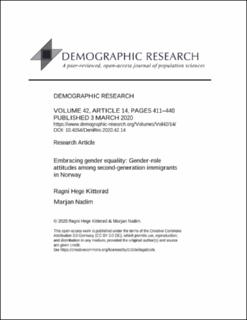| dc.description.abstract | BACKGROUND The consequences of immigration for gender equality is of high public concern. A key issue is to what extent the children of immigrants adopt the more gender-egalitarian work–family attitudes and practices prevalent in the societies where they have grown up. OBJECTIVE This study examines the support for gender-equal work–family practices among second-generation immigrants in Norway, a country with high gender-equality ambitions. We analyze attitudes toward the role of both genders in the family and the labor market among descendants of Sri Lankan, Vietnamese, Turkish, and Pakistani origin, and make comparisons with the majority population and same-age immigrants. METHOD Cross-sectional data (N = 1,049/586 for descendants/immigrants) comes from the Survey on living conditions among persons with an immigrant background 2016 in Norway. RESULTS Second-generation immigrants embrace the ideas of the working mother, shared breadwinning, and shared care to the same extent as the majority population, but express somewhat more support for the homemaker role. There are few consistent dividing lines among descendants, although women express more gender-egalitarian attitudes than men, and men of Pakistani origin are less supportive than other male descendants. Religiosity and the composition of the friendship network matter for some groups. Descendants express slightly more gender-egalitarian work–family attitudes than same-age immigrants. CONTRIBUTION This study reveals that second-generation immigrants in Norway express overwhelming support for the dual-earner/dual-carer family model, suggesting that exposure to a gender-egalitarian institutional and cultural context is important in shaping gender-role attitudes post migration. | |
